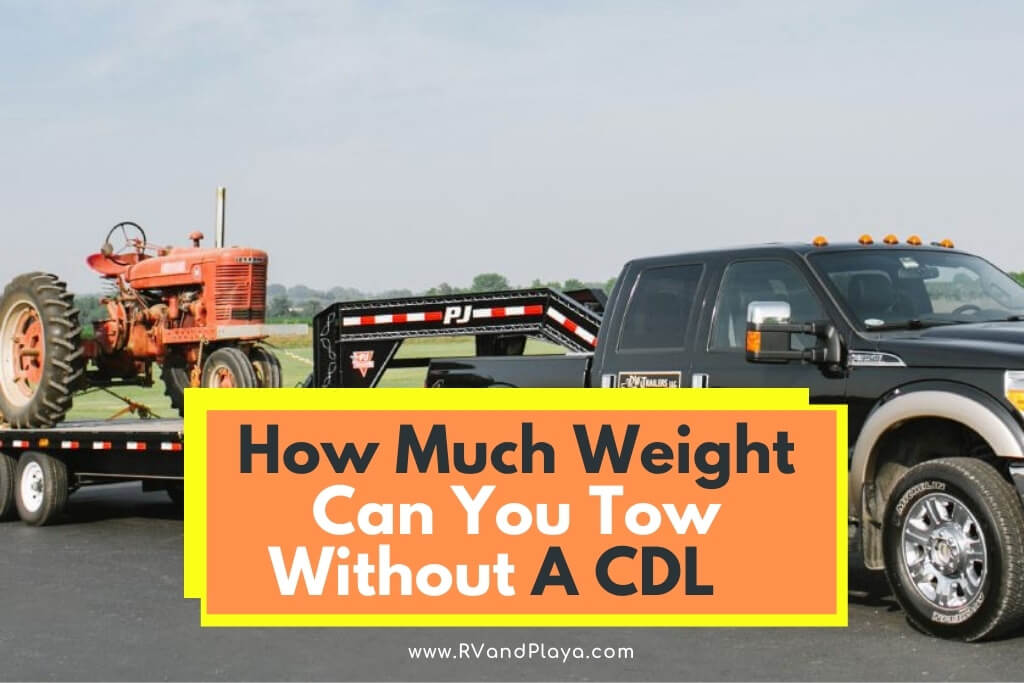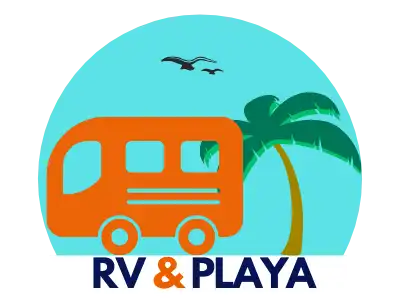Do you know how much weight you can tow without a commercial license? this is one of the questions our readers ask a lot. Well, we´ve got you covered.
Have you ever been in a situation that you need to figure out whether you need a Commercial Driver’s License to tow some particular weight?
For example, have you ever decided against renting some RV trailer because you wanted to play safe as you were not certain that you are allowed to pull it with your truck and non-CDL driver’s license?
So, how much weight can you tow without a commercial license? In short, you can tow a trailer with the GVWR of 10,000 pounds or less without a CDL license and the GCWR of those two vehicles must not exceed 26,000 pounds.
Table of Contents
How Much Weight Can You Tow Without A CDL?
The actual combination of the GVWRs of your vehicle can be substantially different, but the most important limitation is that the GVWR of towed vehicle must not be higher than 10,000 pounds.
In practice, this means that if you are towing a trailer with the maximum 10,000 pounds allowed GVWR, you must not use it for towing a vehicle with GVWR minus the maximum tongue weight higher than 16,000.
If the towing vehicle has a greater GVWR, it eats into the maximum GVWR of the trailer.
So here are some examples, a 2022 Ford F-450 without the optional towing package has a GVWR of 16,000.
With it, you do not need a CDL for towing trailers with GVWR up to 10,000 pounds, in terms of the RV trailers that means roughly 38 feet and shorter ones.
Smaller trucks than F-450, Dodge Ram 3500, and so on, will also let you tow up to 10,000 pounds GVWR trailers, as that is the maximum allowed, even though some may erroneously presume that one could tow a heavier trailer until GCWR of 26,000 pounds is reached.
On the other hand, a 2021 Dodge Ram 5500, without the optional towing package, has a GVWR of 18,000 pounds.
With it, because its rating eats into the 10,000 lbs trailer budget, you need to subtract the tongue weight rating of 1,500 pounds or more, depending on the equipment.
When you calculate it, it comes out that the maximum GVWR of the trailer you can pull with Ram 5500, while not requiring a CDL, is 9,500 pounds, or the majority of 36 feet long trailers and shorter.
Read also: Do I Need A CDL For Trucks Under 26,000 Lbs?
What is CDL?
In the simplest terms, a Commercial Driver’s License is a type of license that you are trained and allowed to drive vehicles that are used for commercial purposes.
It sounds confusing, I know. But it means vehicles for transporting large amounts of goods or people.
Driving a passenger vehicle on the roads requires certain skills and knowledge because cars can speed up to speeds that can be dangerous in the case of an accident.
But commercial vehicles can have a substantially higher weight or higher number of passengers, and a certain specific skill set is required to safely drive them.
That’s why Commercial Driver’s License is required for them.
There are three classes of CDLs:
- Class A – allows the operation of a combination of vehicles with a GCWR of above 26,000 pounds if the GVWR of the towed trailer is above 10,000 pounds. In other words, this license is for 18-wheeler semi-trucks.
- Class B – allows driving of vehicles with GVWR above 26,000 pounds, if towing the GVWR of the trailer must not exceed 10,000 pounds. In other words, cement trucks, dump trucks, heavy-duty box trucks, and so on.
- Class C – allows for using some special vehicles irrespective of their GVWR, those intended for transporting more than 16 passengers or hazardous materials. In other words, this license is for buses and tank trucks.
Read also: What Is The Class B CDL Max Weight Limit
What are GCWR and GVWR?
Gross Combined Weight Rating and Gross Vehicle Weight Rating are very important facts about the vehicle you plan to drive and tow when the need for a CDL is in question.
The Gross Vehicle Weight Rating or GVWR is the maximum allowed weight for any vehicle, whether it is a towing or towed one.
All vehicles have it specified by the manufacturer, and all have it, it doesn’t matter whether it is a passenger car, a truck, RV, or a trailer.
It includes everything when it comes to a weight of a vehicle, its curb weight, all of the fluids at the maximum capacity, passengers, any other cargo, plus the maximum tongue weight rating of your vehicle.
For trailers, the GVWR is simply the sum of dry weight and maximum payload.
All of these things, and people, when loaded into your vehicle, must not exceed the GVWR written on the sticker on the inside of the driver’s doors on your vehicle.
Read also: Do I Need A CDL For Private Or Personal Use?
Gross Combined Weight Rating is all of that, but for when towing one or more other vehicles.
When talking about GCWR, you have to have in mind that this rating takes into account also the maximum capacity of various tanks some vehicles can have, for example, black and gray water tanks on RVs.
But it excludes the tongue weight rating of the towing vehicle, as it is 10-20% of the trailer’s weight that is carried by the rear axle of the towing vehicle and thus a part of the trailer’s GVWR.
GCWR covers the sum of GVWRs of towing and towed vehicles, and in some cases, there can be more than a single towed one, such as with double- or triple-trailer trucks.
One thing you must be cautious about is that many car manufacturers do state something they call GCWR for their vehicles, particularly trucks.
This is a misleading number, as it is calculated from the vehicle’s GVWR and maximum towing capacity, in other words, it is the maximum allowed GCWR for that vehicle.
It does not mean that you need a CDL if this number is above 26,000 lbs, as the CDL requirement concerns a trailer you have attached and not a trailer you could tow.
Read also: What Are CDL Restrictions?
Here are some of my favorite services, products, and Stores
Thank you for reading this article. I hope it helps you find the most recent and accurate RV, camping information. Here are some services, products, and Stores that I use and hope you´ll also find helpful.
There are affiliate links, so if you do decide to use any of them, I´ll earn a small commission. But in all honesty, these are the exact what I use and recommend to everyone, even my own family.
To see all my of most up-to-date recommendations, check out this resource that I made for you!
References
https://www.fmcsa.dot.gov/registration/commercial-drivers-license/drivers
https://www.ford.com/commercial-trucks/chassis-cab/models/f550-xl/
Recent Posts
What Are CDL Restrictions? (Codes, Endorsements, O, E, M, and L)
Do you know what are CDL restrictions – O, E, M, and L restrictions? this is one of the questions our readers ask a lot. Well, we´ve got you covered. The divide between what constitutes the...
What's The Longest Trailer You Can Pull Without A CDL? (Explained)
Have you ever wondered what´s the longest trailer you can pull without a CDL? Look no more. We´ve got you covered. We are not going to lie to you here. The Commercial Driver License (CDL) laws...


